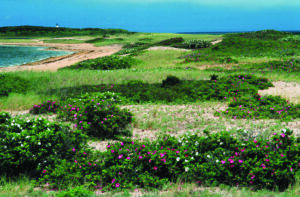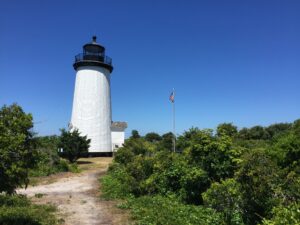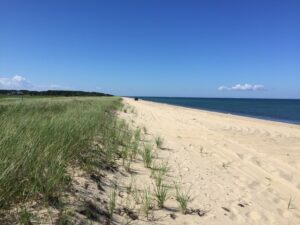By Colin McCandless, Contributing writer

Photo/Richard Cheek
Chappaquiddick Island – Nestled on Chappaquiddick Island lies a hidden gem called Cape Poge Wildlife Refuge, featuring 516 pristine acres of secluded barrier beach and the 19th century Cape Poge Lighthouse.
“Chappy,” as the island is also known, offers a quieter, more tranquil alternative for people looking to escape the “traffic and hustle and bustle of Martha’s Vineyard,” especially during the peak tourism season of summer, explained Dan Karparis, down island steward for The Trustees of Reservations, which owns and manages Cape Poge, along with Chappy’s adjacent Mytoi and Wasque properties. Altogether, nearly a third of Chappy is maintained as conservation land, according to Karparis.
While just a quick ferry ride from Martha’s Vineyard, Cape Poge boasts its own wildly beautiful and unique landscape of sandy shoreline, coastal dunes, expansive salt marsh, a salt pond and an old growth forest of eastern red cedars.
Recreational activities

Photo/The Trustees of Reservations
Recreational and enrichment activities abound on the refuge, including a guided lighthouse tour of the Cape Poge Lighthouse. The most recent iteration of the lighthouse was built in 1893, but its origins date back to 1801. Tours run daily three times a day, with guides imparting the cultural history and ecological significance of the island.
“The tour is the only way to access the interior of the lighthouse, which the U.S. Coast Guard operates,” Karparis explained. Climb its spiral staircase and learn some of the fascinating stories of the lighthouse keepers who kept sentry over this stretch of ocean and helped ships navigate through the “shoal waters and shallows of Muskeget Channel into Edgartown Harbor.”
For a different perspective of the refuge, register for one of their guided discovery kayak tours, where a natural history and engagement ranger will lead you through Poucha Pond and out into Cape Poge Bay, while reciting the ecological history and detailing local flora and fauna of Cape Poge’s saltmarsh and coastal ponds. That wildlife includes protected nesting seabirds like the state threatened piping plovers and endangered roseate terns. Least terns and American oystercatchers also brood their chicks here. “We try really hard to protect all birds on our property,” stated Karparis, of the conservation efforts of The Trustees of Reservations, a nonprofit dedicated to preserving natural and historical places in the commonwealth of Massachusetts.
If you opt to explore the refuge on foot, Cape Poge offers ample upland hiking trails, or you can traverse the beach or jog, walk or bike on the island’s lone eponymous paved road (approximately three miles). Over-sand vehicle trails and guided over-sand vehicle tours are available to those who prefer seeing the refuge’s diverse upland, marine habitats from the comfort of a jeep or truck.
Accessing Cape Poge

Photo/The Trustees of Reservations
Visitors should be aware that accessing Cape Poge Wildlife Refuge does involve a time commitment of catching two ferries just to reach the refuge. The first leg entails taking a 45-minute, three-car ferry from Cape Cod at Woods Hole to Martha’s Vineyard and then a second, much shorter ferry ride brings you from Edgartown-Martha’s Vineyard to Chappaquiddick. Once you arrive on the island, Chappaquiddick Road leads you to a free public parking area.
As of publication, there were no guest limitations due to COVID-19, but tickets must be purchased in advance online, noted Karparis. Cape Poge tickets also provide you free entry to the Trustees’ Mytoi and Wasque properties.
For more information on Cape Poge and other Trustees properties, visit thetrustees.org.












